|
The tears are surprisingly near the surface even now; even after 20
years.
It seems almost unbelievable that it all happened so long ago, and yet
the awfulness of that summer morning when I found my baby boy Sebastian,
dead in his cot, never wanes. The emotions can still flood back and hit
me like a hammer blow.
Over the two decades since that day, other bereaved parents and experts
have assured me that Ďthe pain fades with time, but the love never
doesí.
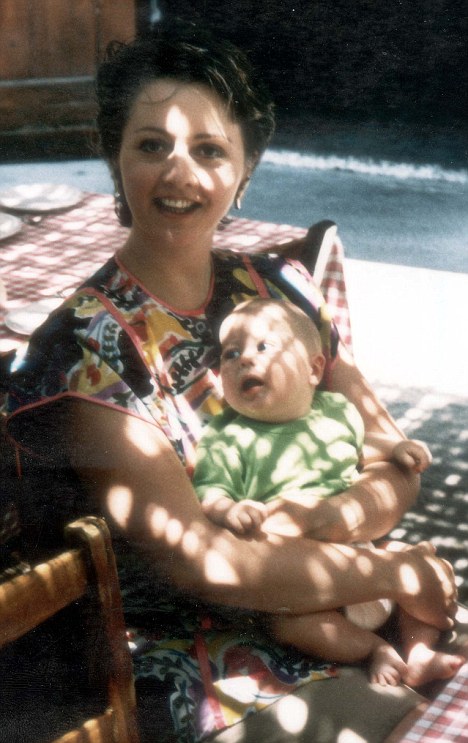 |
|
Precious
moments: Anne cuddles her healthy baby boy, Sebastian, who
died aged just four months |
I have clung to that mantra through some very dark times, and it has
helped. But as I remember the moment I helped my two older sons, Oliver
(then four) and James (just two), say their last goodbye to their little
brother, the tears still well up, my voice cracks, and the rawness of
the pain still shocks me.
Iíve constantly tried to ensure that Sebastianís life, of just
four-and-a-half months, remains larger than his death - at least to his
family. Of course, his loss in 1991, when I was a presenter on morning
television, became huge news and the focus of a national campaign to
help prevent cot deaths like his. A campaign that experts say has saved
as many as 20,000 lives.
It always makes me look back with immense pride as well as grief. My
little boyís death was not in vain.
But when the family get together, as we did just a couple of days ago,
this time to celebrate Oliverís 24th birthday in a local Chinese
restaurant around a big family table, I am always aware of Sebastianís
absence and I canít help thinking what might have been had he lived.
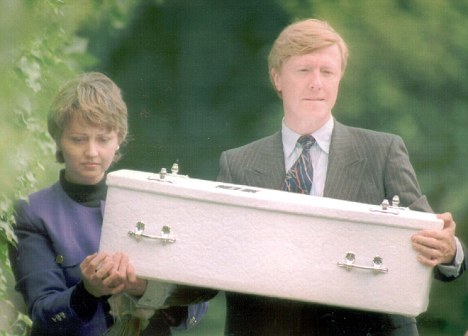 |
|
Grief:
Anne and Mike Hollingsworth carrying their son's tiny coffin |
I know exactly how heíd be. A tall, strapping lad with a rugby playerís
build, strawberry blond hair and a slightly freckly complexion. Thatís
the child I used to envisage when I looked into his babyís face.
Even after all this time, I know just where Iíd pick up the conversation
with him. Iíve had lots of imagined chats with him over the years. And
Iíve many times fantasised how it would be if the past 20 years were
just a horrible dream, and I woke up to find him living with us, just as
ordinarily as his brothers.
|
Please donít
think, for a minute, that I live in a constant state of
mourning, like Miss Havisham, with a cobweb-strewn nursery
upstairs and a penchant for the morbid and tragic. |
Please donít think, for a minute, that I live in a constant state
of mourning, like Miss Havisham, with a cobweb-strewn nursery upstairs
and a penchant for the morbid and tragic. Thanks to my four other sons,
I have always been determined to be a vibrant family of which Sebastian
would be proud.
But while grief - I think - never leaves you, it does mature,
like an old wine. Just very occasionally it actually tastes warm and
comforting to indulge in, but itís stronger than you think, and can
knock you back unexpectedly.
One terrible, cruel feature of Sebastianís death was that it
happened on my eldest son Oliverís fourth birthday.
One particular photo, too poignant to stick into any family
album, sums up the sorrow of that day.
I havenít seen it for years. It surfaced just a few days ago,
when I was researching for a speech I was asked to give to the
Foundation for the Study of Infant Death.
There, amid the reams of paperwork and reports, was the picture
of Oliver, taken on the day he should have celebrated being four, but
which became the day his little brother died and our world turned upside
down.
It is of him wearing an enormous policemanís helmet, looking more
perplexed than happy at the events unfolding around him.
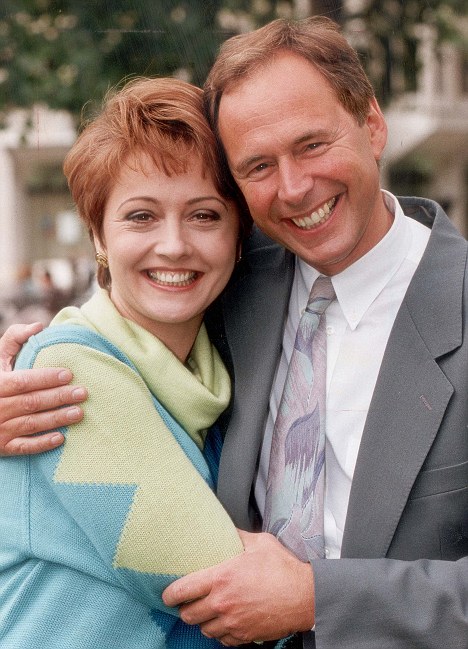 |
|
Breakfast favourite: Anne, pictured here with co-presenter
Nick Owen, was at the height of her fame when tragedy struck |
It had
all started out so happily.
The
children had all slept well and Iíd had a lie-in until 7am. I remember
thinking how lucky that Sebastian hadnít woken early, because it gave me
time to go into the big boysí room and sing Happy Birthday to Oliver.
Then I popped into the babyís room.
I could
tell immediately something was wrong. Sebastianís arm was dangling
through the bars of his cot and he looked strangely still. The moment I
touched him, the thundering reality hit me. He was cold, and deadly
stiff.
Do you
know, you donít even scream straight away? You just try to take in a
truth thatís so terrible, your senses reel and reject, and you freeze.
Then I
snapped into real time and ran to the window to call for help.
I could
see my then husband, Mike, below, pacing out the lawn for a marquee for
Oliverís birthday party, lots of little four-year-olds coming to eat
cake.
I yelled
then - louder than Iíd ever screamed anything in all my life - and
pulled at the safety bars of the window. One bar came clean away in my
hand. I rapped furiously on the window pane and I saw Mike look up, his
face at first curious, changing within a split second to horror. I saw
him start to run. I turned back to the cot.
|
The cold of
his body was chilling - the back of his head, where I always
put a steadying hand, felt like a ball of stone. His face
seemed cruelly squashed and his flesh deadly white, except
for purple blotches where the blood had settled. |
The strange thing is, Iíd never seen a dead person before. But I
knew death - Iíd seen dead pets, long ago, in my childhood. I recognised
the hopeless, despairing numbing certainty of rigor mortis in my
darling boy. My precious, warm, milky son was now a stiff cold statue,
like a porcelain doll.
The cold of his body was chilling - the back of his head, where I
always put a steadying hand, felt like a ball of stone. His face seemed
cruelly squashed and his flesh deadly white, except for purple blotches
where the blood had settled.
I staggered back into the rocking chair, where the previous
night, just a few hours before, Iíd given him his evening feed, and I
rocked this little statue while Mike bounded up the stairs, took in the
horror, dialled 999, instructed our wonderful nanny, Alex, to look after
Oliver and James, and we waited in shocked silence for something to
happen.
It was hurting to hold him, he was so cold, but I couldnít bear
to let go.
A young policeman almost fell through the door, white with shock.
He knelt beside me and I could see his eyes were reddening. Then
a tear whitened his cheek.
ĎIím so terribly sorry,í he faltered. ĎYou see, the same thing
happened to me . . .í
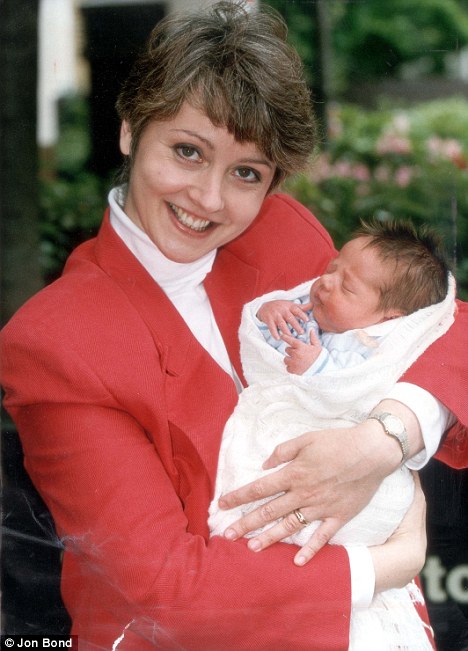 |
|
'It's lovely to have a baby in the family again': After the
death of Sebastian, Anne went on to have another son |
I held out a hand to him. Mike stood back, almost unable to take
in the monstrosity of it all, and then he put an arm around the
policemanís shoulders. We all surrendered to more tears.
And so there we were, like actors in some grotesque, slow-motion
dream sequence from a morbid movie. Three grown adults weeping like
babies over a dead child, in a pastel playroom nursery on a sunny summer
morning in London.
When I look back on it now, itís almost gothic in its melodrama.
And yet there it is. It really happened. To tell its awful truth, even
after 20 years, is not to dwell on grief but to find a way to cope with
life.
|
Anyone whoís
ever been through anything this tragic knows that real life
can appear so unrealistic no film director would accept the
storyline. |
Anyone whoís ever been through anything this tragic knows that real life
can appear so unrealistic no film director would accept the storyline.
I often think of Madeleine
McCannís parents. The horror theyíve been through would have to be
watered down to become believable. It was the same with us.
My little family fled to my parentsí home in Bournemouth to get
away from the paparazzi. My dad stood watch at the garden gate with a
high-powered garden hose to fend off the long lenses. We even laughed
about it at the time. Yet it worked ó it kept the photographers away.
I asked if we could donate Sebastianís organs to children who
needed, perhaps, his corneas, his heart, his kidneys. Right away, I was
desperate that his death should mean something. We were told it wasnít
possible, since heíd been dead for hours and there would have to be a
post-mortem.
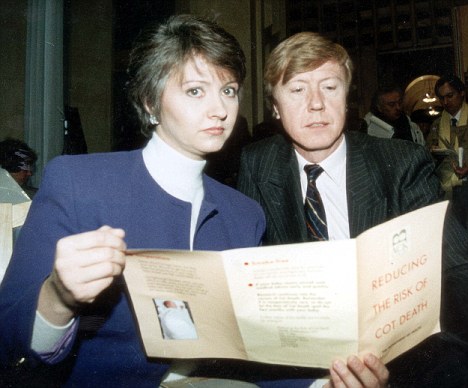 |
|
Lighting fires: After the death of Sebastian, Anne and Mike
kick-started a cot death awareness campaign |
Sky News
burbled in the corner of every room. ĎAnne Diamondís baby has died of
cot death,í the presenter said and I thought ó how come they know whatís
killed him when I donít?
So
intense was the present that the future seemed impossible to comprehend.
But life
started to go on, even though every minute felt like a betrayal. I
decided I wanted a chorister to sing at Sebastianís funeral service, and
my best friend Shirley, whoís a whizz at fixing just about anything,
managed to find a boy living nearby who was the runner-up to Chorister
Of The Year.
She got
him to turn up and sing a beautiful Nunc Dimittis, and he even brought a
fellow trumpeter with him.
Wonderful, sad, inspirational letters flooded in from the famous and
sympathetic and similarly bereaved. The former England footballer Jimmy
Greaves had been through the same tragedy himself and wrote to offer his
sympathy.
One card
was from a woman in Andover, who had lost her child to cot death, too.
She wrote: ĎThey do say time heals but believe me, Anne, you never
forget. My Robert would have been 50 now. I always have a little weep
when I go to his grave. I am nearly 77 years old.í
I
remember reading that and thinking ó will I be able to go on and one day
look back over so many, many years at Sebastianís short life and death?
Will I still feel such pain, for ever?
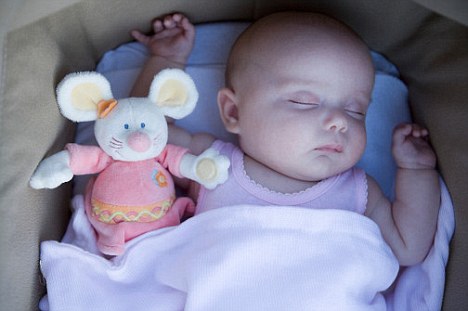 |
|
Sweet dreams: The number of cot deaths has reduced
dramatically in the last 20 years. Research shows that the
risk is cut if babies sleep on their backs |
And now, 20 years later, here I am. Lucky, very lucky, in some
ways because my babyís death did indeed spark a life-saving campaign. So
many others I have met lost their children when research was in its
infancy, and there were no campaigns to start, no advice to give.
But in 1991 we had indeed found a breakthrough and yet the
information had not been passed on to mums and dads in Britain.
Theyíd found in a huge national study in New Zealand, and in a
smaller study in Avon in the UK, that the babies who were dying of cot
death were those who were lying on their tummies to sleep. The truth is
that the Department of Health knew this astonishing fact and was waiting
for more data.
In fact, theyíd agreed to let British babies act as a Ďcontrol
groupí for the intervention in New Zealand, where every mum and dad was
being told to turn their baby over.
Itís a scandal thatís almost impossible to fully grasp. Our
Department of Health had actually agreed NOT to tell parents the
life-saving advice, while in New Zealand (and in Avon) there were
full-blown campaigns to save lives.
Thatís the point at which Sebastian was born, lived his short
life, and died. I still believe that if we had lived in Bristol or New
Zealand, he would be alive today.
In my anguish, I turned to everyone I could think of to get
British parents the same deal.
I even went to Jeffrey Archer, to ask how I could get to see the
then prime minister, John Major. He advised me that ministers are like
firemen. They donít have time to put out every fire, only the hottest
ones.
So I decided to make a big blaze. Thatís why I prostituted my
grief on every TV and radio programme I could, at this very time 20
years ago, to demand a life-saving campaign out of the Government. And
it worked. I got a call from Virginia Bottomley, then health minister.
Would I pop round to her offices in Whitehall?
I had trouble convincing her we needed a TV campaign. She told me
that young mothers didnít watch TV, they read baby magazines. I was
gobsmacked. Who did she think watched Richard And Judy, Neighbours, Home
And Away, and my own programme, Good Morning Britain?
I had a mailbag from young mothers who liked to breastfeed while
they watched me, and thanked me for the little clock in the corner of
the screen - it helped them time Ďten minutes each breastí!
I made my own TV ad, and with money from Mothercare we showed it
in the Coronation Street ad break. We could only afford one showing, but
it worked. The next phone call from Whitehall showed the Government had
woken up.
And that is how we eventually got the Back To Sleep campaign.
It ran on TV throughout the winter of 1991 and started saving
lives immediately.
Cot death numbers plummeted from 2,500 a year to about 300, where
they stubbornly remain even now. The Golden Rules still apply - babies
must sleep on their backs, must not be overwrapped, and smoking near
them can be deadly.
If only we could get young parents to stop smoking, the figures
could fall further. But itís hard to get that message through to a hard
core of desperately poor, often single mums who canít cope as it is.
Even more frightening is the evidence that some young mums are
beginning to talk on internet chat rooms about the fact that laying your
baby on his tummy might actually make him sleep longer, and more
soundly.
After 20 years, they seem to have forgotten the spectre of cot
death and could be putting their babies in danger, despite the warnings
theyíre given in hospital.
Perhaps it is time for another cot death campaign, to renew the
life-saving message. Donít letís wait for another high-profile death to
spur us into action.
Sebastian has no grave at which to weep. Only his father and I
know where his ashes are scattered. Thatís how we wanted it. I prefer
memories and photographs to remember him by.
One well-wisher wrote to me: ĎIf heaven is like some sort of
fantastic Disneyland, then think that Sebastian is already on the
rides!í When his death was young, that was a comfort while I needed such
emotional props.
Today, though, I think of him as the young man only his mother
still knows . . |








